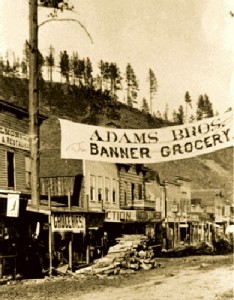The infamous Wild West town of Deadwood was profiled in all its raffish, criminal, merciless glory in the the August 13, 1877 New York Times. An excerpt:
“Deadwood is as lively as ever. It is a queer place. The man who ventured the remark that a fool and his money are soon parted must have had in his mind’s eye some such place as this. It is the sharpers’ paradise. The ‘tenderfoot’ is here brought face to face with the ingenious bummer, the slick confidence man, the claim jumper, the land shark and the desperado, and he is a man of more than usual alertness who does not get ‘taken in’ somehow or other before he has been 24 hours in this sinful city. There is no such place anywhere. It shows up in its worst forms the ‘fast and flash’ American trait. A little over a year ago the site of this swarming camp was a part of the howling wilderness. To-day there are along the streets and up and down in the gulches, within a mile, over 10,000 people. Here is a city of 4,000 inhabitants, with a floating population of 2,000 more. About 1,500 houses and huts, and hundreds of tents up the hill-sides, an academy, church, two daily newspapers, four banks; 20 lawyers, physicians, dentists, artists; club-houses, theatres in full blast every night, the streets thronged with speculators, tramps, and bummers: gambling-hells open all day long, and ‘cappers’ on every corner watching for the next ‘victim’–such is a hasty glance at Deadwood. It is a place in which the few prey upon the many. You cannot buy anything for less than a quarter; your living costs you double what it would at Denver or Salt Lake City. You can’t step in any direction without facing some device for getting rid of your money. They have even got a ‘corner’ on postage stamps and you must pay from a dime to a quarter for a three-cent stamp. It is no wonder that the thousands who come here with a few dollars in their pockets soon find themselves ‘dead broke’ and dependent upon the charity of the better class of people. It cannot be urged too strongly that poor men or men of small competence should stay away from Black Hills. It may not be out of the way for capitalists to come and look around; but let the poor man stay away. One of the business men here, seeing the condition of the hundreds who lay idle and pennilesss about the street, has the honesty to write to the Deadwood Times, for the benefit of ‘pilgrims,’ in which he says that the truth ought to be told. and the ‘tenderfeet’ be advised to stay at home. I quote from his communication:
 ‘There are thousands of men in the Hills who would be glad to work for their bread, or enough money to pay their way back home; but there is no employment for them. The placer claims are all taken up by the first comers, and the quartz leads are not yet sufficiently developed to require many laborers. I never saw so many sick-looking men in my life as I have seen in Deadwood. They come here without a cent in their pockets, expecting to gobble up gold by the bucketful, and they soon go away without a ‘flea in the ear.’ Now these pilgrims are not only fools in this ‘vain delusive world.’ They come here full of greedy expectation, but in 24 hours their gorgeous air castles have blown away into bubbles.'”
‘There are thousands of men in the Hills who would be glad to work for their bread, or enough money to pay their way back home; but there is no employment for them. The placer claims are all taken up by the first comers, and the quartz leads are not yet sufficiently developed to require many laborers. I never saw so many sick-looking men in my life as I have seen in Deadwood. They come here without a cent in their pockets, expecting to gobble up gold by the bucketful, and they soon go away without a ‘flea in the ear.’ Now these pilgrims are not only fools in this ‘vain delusive world.’ They come here full of greedy expectation, but in 24 hours their gorgeous air castles have blown away into bubbles.'”

